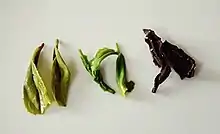Yellow tea
Yellow tea can refer to Chinese huángchá (黄茶; 黃茶) and Korean hwangcha (황차; 黃茶).[1][2]
 | |
| Type | Tea |
|---|---|
| Country of origin | China |
| Region of origin | East Asia |
| Colour | Yellow |
| Ingredients | Tea leaves |
| Related products | Tea |
Chinese huangcha
| Chinese name | |||||||||||||||
|---|---|---|---|---|---|---|---|---|---|---|---|---|---|---|---|
| Traditional Chinese | 黃茶 | ||||||||||||||
| Simplified Chinese | 黄茶 | ||||||||||||||
| Literal meaning | Yellow tea | ||||||||||||||
| |||||||||||||||
It is an increasingly rare and expensive variety of tea.[3]:58 The process for making yellow tea is similar to that of green but with an added step of encasing and steaming the tea. This allows the tea to oxidize at a slow rate for a brief period before the tea is heated fully to denature the oxidizing enzymes, producing a far more mellow taste than is found in most green teas; this also gives the leaves a slightly yellow coloring during the drying process.[3]:32 Yellow tea is often placed in the same category with green tea due to its light oxidation. One of the primary aims of making yellow tea is to remove the characteristic grassy smell of green tea.
Varieties
- Junshan Yinzhen (君山銀針): from Hunan Province, China is a Silver Needle yellow tea. A Chinese Famous Tea.
- Huoshan Huangya (霍山黃芽): from Mt. Huo, Anhui Province, China.
- Meng Ding Huangya (蒙頂黃芽): from Mt. Meng, Ya'an, Sichuan Province, China.
- Mogan Huangya (莫干黃芽): from Mount Mogan, Zhejiang Province, China.
- Beigang Maojian (北港毛尖): from Yueyang, Hunan Province, China. Also known by the Tang Dynasty-era name Yōnghúchá (邕湖茶).
- Weishan Maojian (溈山毛尖): from Mt. Wei, Weishan Township, Ningxiang, Hunan Province, China.
- Haimagong Cha (海馬宮茶): from Dafang County, Guizhou Province, China.
- Da Ye Qing (大葉青): from Guangdong Province, China. Literally Big Leaf Green.
- Pingyang Huangtang (平陽黃湯): from Zhejiang Province, China. Could be called one of the Wenzhou Huangtang (溫州黃湯); the latter term is literally translated as Yellow Broth or Yellow Soup.
- Yuan'an Luyuan (遠安鹿苑): from Yuan'an County, Hubei Province, China.
Korean hwangcha
| Korean name | |
| Hangul | 황차 |
|---|---|
| Hanja | 黃茶 |
| Revised Romanization | hwangcha |
| McCune–Reischauer | hwangch'a |
| IPA | [hwaŋ.tɕʰa] |
In Korean tea terminology wherein domestic tea is categorized mainly as either green tea (nokcha; 녹차) or fermented tea (balhyocha; 발효차) – "fermented" practically meaning "oxidized" with this term[4] – "yellow tea" (hwangcha) is used to denote lightly oxidized balhyocha without implications of processing methods or a result that would qualify the tea as "yellow tea" in the Chinese definition.[4] Unlike Chinese huángchá, Korean hwangcha is made similarly to oolong tea or lightly oxidized black tea, depending on who makes it – the key feature is a noticeable but otherwise relatively low level of oxidation which leaves the resulting tea liquor yellow in color.

.jpg.webp) Hadong hwangcha
Hadong hwangcha Hwangcha
Hwangcha.jpg.webp) infusing hwangcha
infusing hwangcha
See also
- Black tea
- Oolong tea (Blue tea)
- Dark tea
- Green tea
- White tea
References
- "黄茶" [huángchá]. LINE Dictionary. Naver Corporation. Retrieved 28 January 2017.
- "hwangcha" 황차 [yellow tea]. Standard Korean Language Dictionary (in Korean). National Institute of Korean Language. Retrieved 28 January 2017.
- Gascoyne, Kevin; Marchand, François; Desharnais, Jasmin; Americi, Hugo (2011). Tea: History, Terroirs, Varieties. Richmond Hill, ON: Firefly Books. ISBN 9781554079377.
- Gebely, Tony (7 December 2013). "South Korean Balhyocha & Hwangcha". World of Tea. Retrieved 28 January 2017.